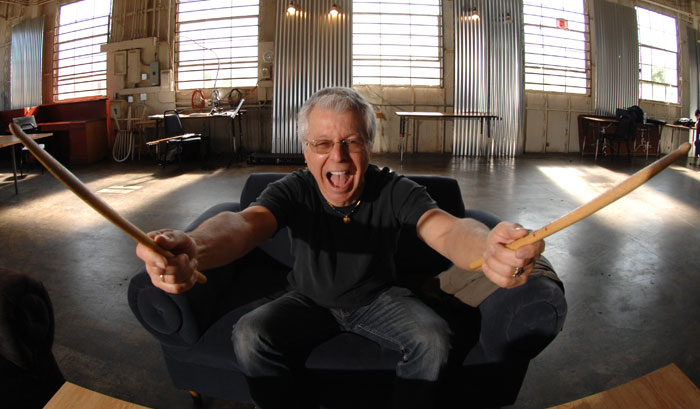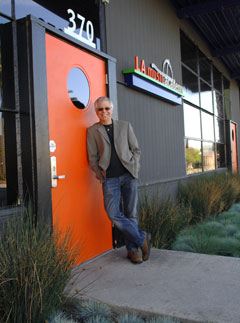


Drummer Ralph Humphrey has played just about everything with just about everybody. He's worked with artists as diverse as Frank Zappa, Barbra Streisand, and Wayne Shorter and played on numerous film and TV projects, including The Simpsons, American Idol, and most recently, the hit show Dancing with the Stars. He's also a published author with a book on odd meters, and a renowned educator who's taught for decades at top percussion schools. We recently caught up with Ralph during a rare free moment in Los Angeles.
For a drummer, too many snares is not enough!
What are the challenges of playing on a show like Dancing with the Stars? The challenge is the same as for any professional: You have to cover your chair. Whatever instrument you play, you have to provide whatever is expected. That starts with being able to read anything that's put in front of you. For a rhythm section player, you also have to capture the right style, which can mean something that's not written in the music--it's more of an interpretation. A lot of composers and leaders rely on rhythm section players to know what to do based on a few descriptive words and a little notation.
Do you play to a click?
We play almost everything to a click. Sometimes the click changes midstream, out of nowhere, and you have to learn how to be able to make those changes. I got that a lot on the cartoon sessions I played for Warner Bros. It was one of the most challenging things I've done.
You must be used to odd meters and quick changes after working with Zappa.
Those experiences gave me the feeling that I could handle anything that's put in front of me. I've been challenged by playing with Zappa, and before that, with Don Ellis, which is what got me into playing odd meters in the first place.

How did you make the leap from progressive big-band jazz to rock and pop?
Good question! I got into the rock world reluctantly. It was 1973, and I'd just left Don's band. I'd never known Zappa's music that intimately, but a friend called and said, "Frank's looking for a drummer. He's gone through quite a few and can't find anyone he's happy with. Would you like to come down and audition?" Frank offered me the job, and I took it because I realized what a challenge it would be. I played for about a year and a half with him. After that, I wanted to develop a session career. I still did some touring throughout the '70s--Seals and Crofts, John Davidson, some other pop acts--but by the early '80s, I was beginning to record more. I did quite a bit of work with Al Jarreau, who was wonderful. There's a saying in the business that musicians hate working with singers, but some singers are great musicians, and Al was one of them. The Manhattan Transfer, too--great people, great music.
You use both maple and birch Yamaha kits. What makes you choose one over another for a gig?
It's mainly about tone. Birch has a little more warmth and depth. I use a Yamaha Recording Custom 20th Anniversary for Dancing with the Stars, and it works great. The thing about Yamaha is, they care. And they always go to pros and ask what they think. They know that if pros are into the instruments, everyone else will be as well.
You also have several custom Yamaha snares.
Yes. Most recently I decided to try a small 12" beech snare, and I also got a maple drum with wood hoops. It's basically one-of-a-kind, and I use it quite a lot. For a drummer, too many snares is not enough! Each one has its own character. It's best to tune each one so you get what you want out of it, then leave it alone, without putting it through a lot of changes. On a typical session, I have at least half a dozen snares sitting there, and I change them from cue to cue. Changing the snare drum is like changing the whole drum kit.
Let's talk about teaching--another huge part of your life.
Yes, it is! I've been teaching at the Los Angeles Music Academy since 1996. Before that, I taught at the Musicians Institute starting in 1980. There is never a shortage of students, even when there's a shortage of jobs. My feeling is that if I have something to share, I want to make sure I can share it with as many people as possible.
What skills do you emphasize?
We teach them how to read, and how to interpret what they read. If a drummer can say "yes" to a situation, it's because they feel prepared to do it. A call can come from anywhere. We want our students to be able to say "yes" and take that job when the call comes through.
























